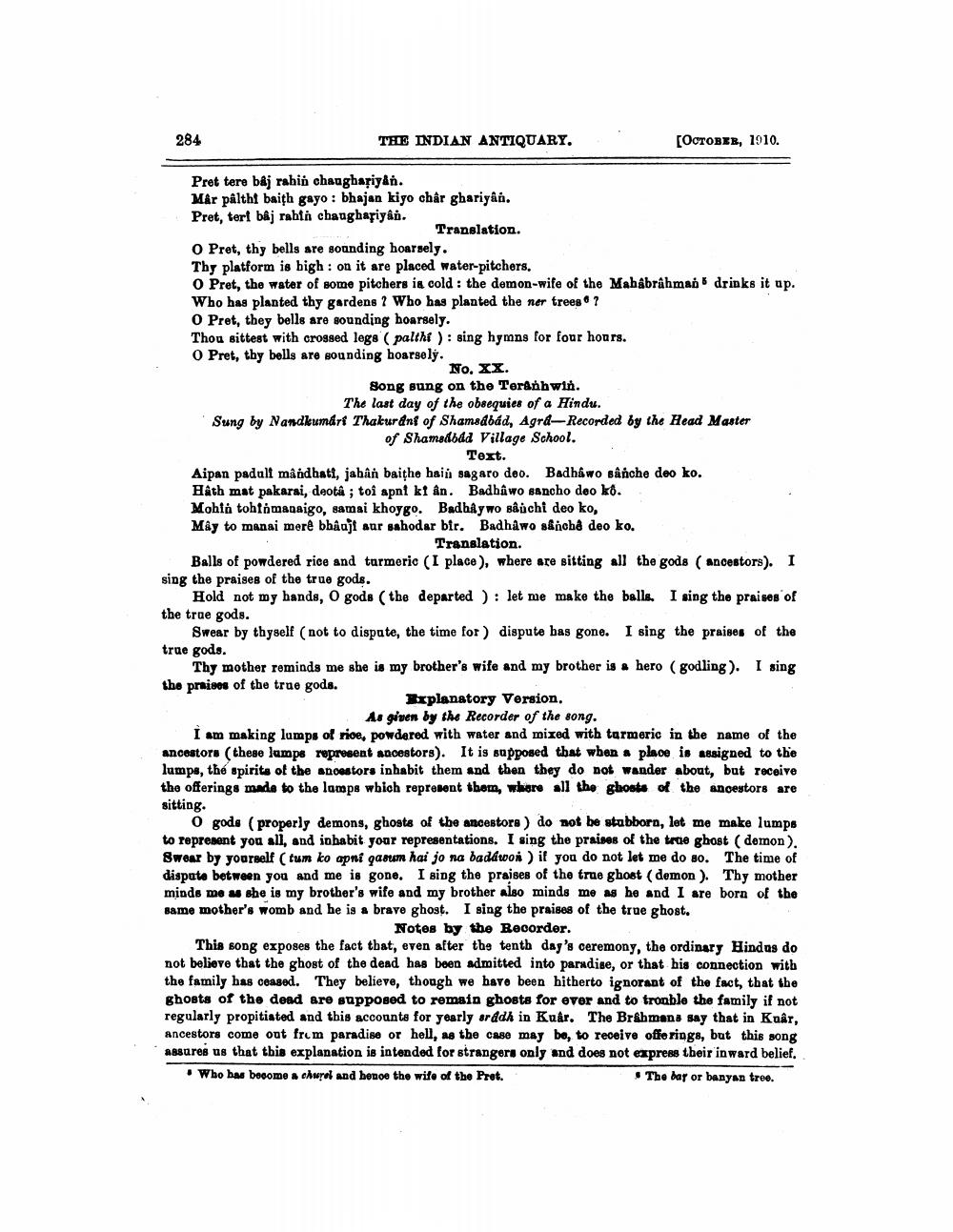________________
284
THE INDIAN ANTIQUARY.
FOCTOBER, 1910.
Pret tere båj rabin chaughariyan. Mår påltht baith gayo : bhajan kiyo châr ghariyan. Pret, tert bâj rabin changhariyan.
Translation. O Pret, thy bells are sounding hoarsely. Thy platform is bigh: on it are placed water-pitchers. O Pret, the water of some pitchers in cold : the demon-wife of the Mahabrahman drinks it up. Who has planted thy gardens ? Who has planted the ner trees? O Pret, they bells are sounding hoarsely. Thou sittest with crossed legs (paltki ) : sing hymns for four hours. O Pret, thy bells are sounding hoarsely.
No. XX. Song sung on the Torańhwin.
The last day of the obsequies of a Hindu. Sung by Nandkumari Thakuráns of Shamedbád, Agra- Recorded by the Head Master
of Shamsibad Village School.
Text. Aipan padult mândhati, jahan baithe hain sagaro deo. Badhawo sânche deo ko. Hath mat pakarai, deota ; toi apnt kt an. Badbâwo sancho deo ko. Mohfá tohtómagaigo, samai khoygo. Badhy wo så ochi deo ko, May to manai mere bhauji aur sahodar bir. Badhawo sancho deo ko.
Translation. Balls of powdered rice and tarmeric (I place), where are sitting all the gods ancestors). I sing the praises of the true gods.
Hold not my hands, O gods (the departed ): let me make the balle. I sing the praises of the true gods.
Swear by thyself (not to dispate, the time for ) dispute bas gone. I sing the praises of the true gods.
Thy mother reminds me she is my brother's wife and my brother is a hero (godling). I sing the praises of the true gods.
Explanatory Version,
As given by the Recorder of the song. I am making lumps of rioe, powdered with water and mixed with tarmeric in the name of the ancestors (these lamps represent ancestors). It is supposed that when a place is assigned to the lumps, the spirits of the ancestors inhabit them and then they do not wander about, but receive the offerings made to the lamps which represent them, where all the ghosts of the ancestors are sitting.
O gods (properly demons, ghosts of the ancestors) do not be stubborn, let me make lumps to represent you alī, and inbabit your representations. I sing the praises of the trae ghost (demon). Swear by yourself (tum ko apni qasum hai jo na badawon ) if you do not let me do so. The time of dispute between you and me is gone. I sing the praises of the true ghost ( demon). Thy mother minds me as she is my brother's wife and my brother also minds me as he and I are born of the same mother's womb and he is a brave ghost. I sing the praises of the true ghost.
Notes by the Beoorder. This song exposes the fact that, even after the tenth day's ceremony, the ordinary Hindus do not believe that the ghost of the dead has been admitted into paradise, or that his connection with the family has ceased. They believe, though we have been hitherto ignorant of the fact, that the ghosts of the dead are supposed to remain ghosts for ever and to tronble the family if not regularly propitiated and this accounts for yearly srddh in Kuar. The Brahmana say that in Kuar, ancestors come out from paradise or hell, as the case may be, to receive offerings, but this song assures us that this explanation is intended for strangers only and does not express their inward belief. • Who has become chwol and benoe the wife of the Prot.
. The bar or banyan tree.




